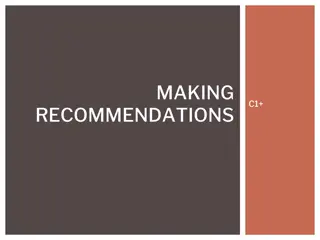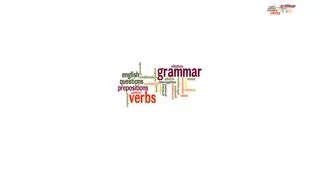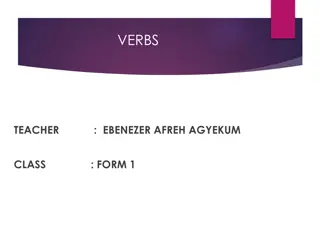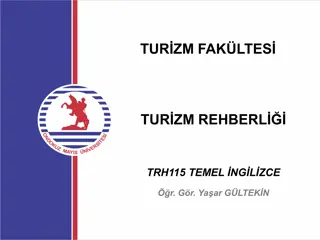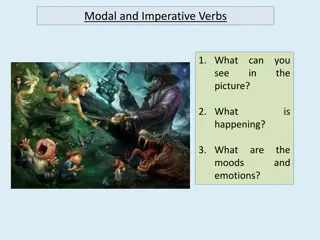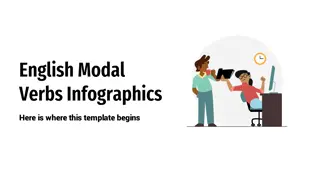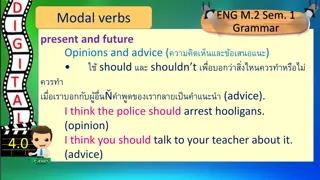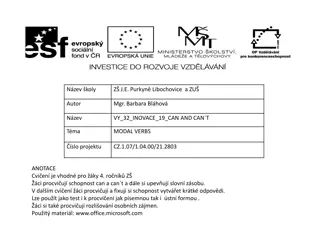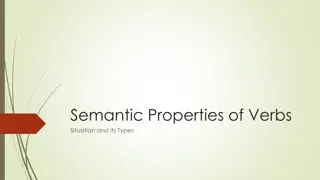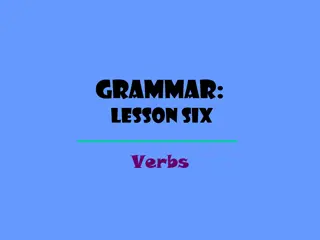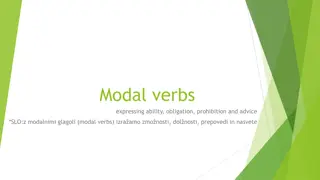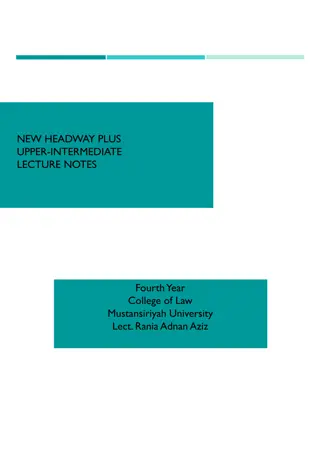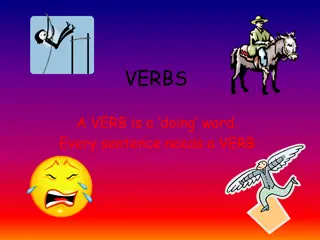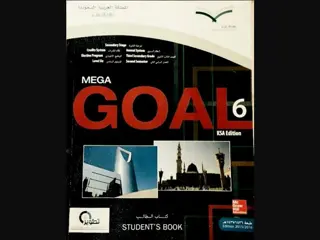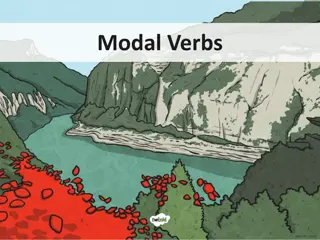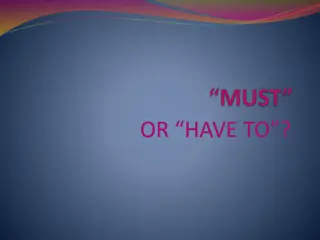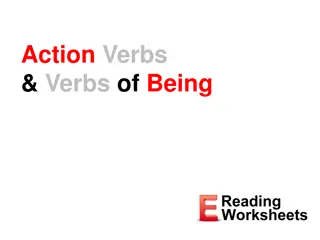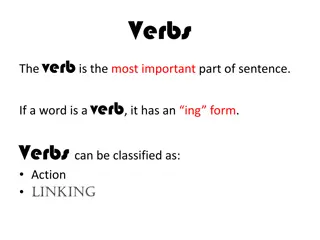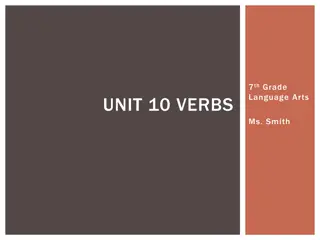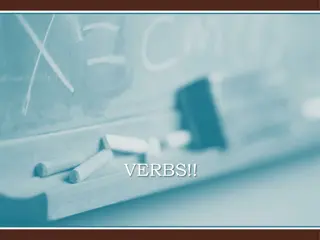Understanding Modal Verbs in English
Modal verbs, also known as modals, are auxiliary verbs that express attitudes and levels of certainty in English. They serve various purposes, such as indicating certainty, ability, permission, and making requests. Modal verbs like can, could, may, might, will, would, must, shall, should, and ought to are used differently from regular verbs and play a significant role in conveying certainty, probability, and possibility in language. Understanding their nuances is essential for effective communication in English.
Download Presentation

Please find below an Image/Link to download the presentation.
The content on the website is provided AS IS for your information and personal use only. It may not be sold, licensed, or shared on other websites without obtaining consent from the author. Download presentation by click this link. If you encounter any issues during the download, it is possible that the publisher has removed the file from their server.
E N D
Presentation Transcript
Modal verbs Modal verbs (called modals for short) are auxiliary verbs that express a speaker s attitude and the strength of that attitude. They have multiple meanings and sometimes overlap in ways that are confusing to English learners. We use modals to show if we believe something is certain, possible or impossible: My keys must be in the car. It might rain tomorrow. That can't be Peter's coat. It's too small. We also use them to do things like talk about ability, ask permission, and make requests and offers: I can't swim. May I ask a question? Could I have some tea, please? Would you like some help?
List of modal verbs: Can Could May Might Will Would Must Shall Should Ought to Modals are different from normal verbs: 1. They don't use an 's' for the third person singular. 2. They make questions by inversion ('she can go' becomes 'can she go?'). 3. They are followed directly by the infinitive of another verb (without 'to').
Certainty, probability and possibility We use may, might and could to say that something is possible, but not certain. We use can to make general statements about what is possible. These modal verbs can be used when we want to say how sure we are that something happened / is happening / will happen. These are often called 'modals of deduction' or 'speculation' or 'certainty' or 'probability . They may come by car. (= Maybe they will come by car). They might be at home. (= Maybe they are at home). If we don't hurry, we could be late. (= Maybe we will be late). It can be very cold here in winter. (= It is sometimes very cold here in winter). You can easily get lost in this town. (= People often get lost in this town).
We dont use can to talk about specific events: A: Where's John? B: I'm not sure. He may/might/could (NOT can) be in his office. Difference in meaning between can and may/might/could: That dog can be dangerous. (= Sometimes that dog is dangerous. I know). That dog may/might/could be dangerous. (= Perhaps that dog is dangerous. I don't know). We use must to show we are sure something is true and we have reasons for our belief: It's getting dark. It must be quite late. You haven t eaten all day. You must be hungry.
We use should to suggest something is true and we have reasons for our suggestion: Ask Miranda. She should know. It's nearly six o'clock. They should arrive soon. Should and shouldn't are used to make an assumption about what is probably true if everything is as we expect: They should be there by now. It shouldn't take long to drive here. We use must have and should have for the past: They hadn't eaten all day. They must have been hungry. You look happy. You must have heard the good news. It's nearly eleven o'clock. They should have arrived by now. Will / won't We use will and won't when we are very sure: She'll be at work now.
We use may have, might have or could have to make guesses about the past: I haven't received your letter. It may have got lost in the post. It's ten o'clock. They might have arrived by now. Where are they? They could have got lost. We use could to make general statements about the past: It could be very cold there in winter. (= It was sometimes very cold there in winter). You could easily get lost in that town. (= People often got lost in that town).
Impossibility We use can't or cannot to say that something is impossible: That can't be true. You cannot be serious. We use can't have or couldn't have to say that a past event was impossible: They know the way here. They can't have got lost! If Jones was at work until six, he couldn't have done the murder.
Ability We use can and can't to talk about someone's skill or general abilities: She can speak several languages. He can swim like a fish. They can't dance very well. We use can and can't to talk about the ability to do something at a specific time in the present or future: I can see you. Help! I can't breathe. We use could and couldn't to talk about the past: She could speak several languages. I couldn't see you. We use could have to say that someone had the ability or opportunity to do something, but did not do it: She could have learned Swahili, but she didn't want to. I could have danced all night. [but I didn t]
Asking for permission We use can to ask for permission to do something: Can I ask a question, please? Can we go home now? Could is more formal and polite than can: Could I ask a question, please? Could we go home now? May is another more formal and polite way of asking for permission: May I ask a question, please? May we go home now?
Giving permission We use can to give permission: You can go home now. You can borrow my pen if you like. May is a more formal and polite way of giving permission: You may go home now. We use can to say that someone has permission to do something: We can go out whenever we want. Students can travel for free. May is a more formal and polite way of saying that someone has permission: Students may travel for free. Refusing permission We use can't and may not to refuse permission or say that someone does not have permission: You can't go home yet. Students may not travel for free.
Requests, offers and invitations Requests We use could you and would you as polite ways of telling or asking someone to do something: Could you take a message, please? Would you carry this for me, please? Can and will are less polite: Can you take a message, please? Will you carry this for me, please? Offers and invitations We use can I to make offers: Can I help you? Can I do that for you? We can also use shall I : Shall I help you with that? Shall I call you on your mobile?
We sometimes say I can ... or I could ... or I'll (I will) ... to make an offer: I can do that for you if you like. I could give you a lift to the station. I'll do that for you if you like. I'll give you a lift to the station. We use would you like (to) ... for invitations: Would you like to come round tomorrow? Would you like another drink? We can use you must or we must for a very polite invitation: You must come round and see us. We must meet again soon.
Suggestions We use should and shouldn't to make suggestions and give advice: You should send an email. You shouldn t go by train. We also use could to make positive suggestions: We could meet at the weekend. You could eat out tonight. We can use conditionals to give advice: Dan will help you if you ask him. (Past tenses are more polite): Dan would help you if you asked him.
Obligations We use must and mustn't to say that it is necessary (or not) to do something: You must stop at a red light. Everyone must bring something to eat. You can wear what you like, but you must look neat and tidy. I m sorry, but you mustn't make a noise in here. We use had to (positive) and couldn't (negative) if we are talking about the past: Everyone had to bring something to eat. You couldn't make a noise in the library.
Using modal verbs to talk about the present Must / might / could / may / can t+infinitive A person who is 100% sure uses the verb be, as in: "I am sick". If they are mostly sure, say 95%, they will use the modal must, as in: "I must be sick". When speakers are about 50 percent sure, they will use the modals may, might, or could; as in: "I may be sick. I might be sick. I could be sick". Example: I am waiting for Julie with another friend, David. I ask: 'Where is Julie?' David guesses: She must be on the bus. (I'm fairly sure this is a good guess) She might come soon. (maybe) She could be lost. (maybe) She may be in the wrong room. (maybe) She can't be at home. (I'm fairly sure this isn't true) The opposite of 'must' is 'can't' in this case.
Using modal verbs to talk about the past: Must / might / could / may / can't+have+past participle must have + past participle might / might not have + past participle could / couldn't have + past participle may / may not have + past participle can't have + past participle Where was Julie last night? David: She must have forgotten about our date. She might have worked late. She could have taken the wrong bus. She may have felt ill. She can't have stayed at home.
Exercises Put in can / can t / could / couldn t . If none is possible, use be able to in the correct tense: 1. _________________ you swim when you were 10? 2. We _________________ get to the meeting on time yesterday because the train was delayed by one hour. 3. He _________________ arrive at the party on time, even after missing the train, so he was very pleased. 4. He s amazing, he _________________ speak 5 languages including Chinese. 5. I _________________ drive a car until I was 34, then I moved to the countryside so I had to learn. 6. I looked everywhere for my glasses but I _________________ find them anywhere. 7. I searched for your house for ages, luckily I _________________ find it in the end. 8. She s 7 years old but she _________________ read yet her parents are getting her extra lessons. 9. I read the book three times but I _________________ understand it. 10. James _________________ speak Japanese when he lived in Japan, but he s forgotten most of it now.
Exercises Put in can / can t / could / couldn t . If none is possible, use be able to in the correct tense: 11. I _________________ understand the chapter we had to read for homework. It was so difficult. 12. I _________________ lift this box it s too heavy! Would you help me? 13. Lucy _________________ make it to our meeting after all. She s stuck in traffic at the moment. 14. John _________________ play tennis really well. He s champion of his club. 15. Unfortunately, I really _________________ sing at all! No-one in my family is musical either. 16. When the car broke down I was really pleased because I _________________ solve the problem. 17. Julian _________________ play excellent golf when he was only ten. 18. My grandmother _________________ use a computer until last month. Since then, she s been taking lessons at the library. 19. I _________________ open this window. I think it s stuck! 20. Gill _________________ play the piano. She s never studied it.



